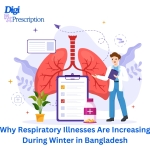
Why Respiratory Illnesses Are Increasing During Winter in Bangladesh
Respiratory illnesses surge during winter in Bangladesh, affecting children, the elderly, and individuals with pre-existing health conditions the most. These illnesses, ranging from common colds to severe infections like pneumonia and HMPV, are attributed to a combination of environmental, lifestyle, and healthcare factors unique to this season.
In this blog post, we’ll explore why respiratory diseases spike during winter and provide actionable tips to protect yourself and your loved ones.
Key Reasons for Increased Respiratory Illnesses in Winter
1. Dry and Cool Air
The cooler air during winter tends to be dry, which can irritate the respiratory tract and reduce the natural defense mechanisms of the body, such as the mucus lining in the airways. This makes it easier for viruses and bacteria to infect the lungs.
2. Increased Viral Activity
Viruses like influenza, RSV, HMPV, and coronaviruses are more active during winter. The cold environment enhances their survival, increasing the risk of transmission.
3. Indoor Crowding
Winter often drives people indoors, especially in Bangladesh, where homes may lack adequate ventilation. Crowded indoor settings increase the likelihood of respiratory droplets spreading infectious diseases.
4. Air Pollution
Air quality deteriorates significantly during winter in Bangladesh due to increased emissions from brick kilns, vehicles, and biomass burning for heating and cooking. Fine particulate matter (PM2.5) can penetrate deep into the lungs, causing or exacerbating respiratory illnesses.
5. Poor Healthcare Access in Rural Areas
In rural parts of Bangladesh, limited access to healthcare during winter increases the severity of respiratory illnesses. Delayed treatment often leads to complications, especially among vulnerable populations like children and the elderly.
6. Seasonal Allergens
Winter brings certain allergens such as mold spores and dust mites, which can worsen asthma and other chronic respiratory conditions.
Common Respiratory Illnesses During Winter
Here are the respiratory illnesses that peak during Bangladesh’s winter season:
- Common Cold: Caused by rhinoviruses, resulting in sneezing, congestion, and sore throat.
- Influenza: A flu virus that can lead to fever, muscle aches, and severe fatigue.
- HMPV: A virus similar to RSV, causing cold-like symptoms and sometimes pneumonia.
- Bronchitis: Inflammation of the bronchial tubes leading to persistent cough and wheezing.
- Pneumonia: A bacterial or viral infection of the lungs that can be life-threatening.
- Asthma Attacks: Triggered by cold air, pollution, or allergens.
Tips to Prevent Respiratory Illnesses in Winter
1. Maintain Good Hygiene
- Wash hands regularly with soap and water for at least 20 seconds.
- Use hand sanitizers when soap isn’t available.
2. Keep Your Home Ventilated
Ensure proper air circulation by opening windows periodically, even during colder days. Use air purifiers if pollution levels are high.
3. Wear Masks
In outdoor and crowded indoor settings, wearing masks can reduce exposure to airborne pollutants and infectious droplets.
4. Stay Warm
Dress in layers and use blankets to protect yourself from the cold. Breathing in cold air can worsen conditions like asthma.
5. Get Vaccinated
- Annual flu vaccines can reduce the risk of severe influenza.
- Pneumonia vaccines are essential for high-risk groups such as the elderly.
6. Strengthen Your Immune System
- Eat a diet rich in fruits, vegetables, and foods high in vitamin C and zinc.
- Stay hydrated and exercise regularly to maintain good overall health.
7. Monitor Air Quality
- Check local air quality indexes (AQI) and avoid outdoor activities when pollution levels are high.
- Use indoor air purifiers to minimize exposure to pollutants.
When to Seek Medical Help
Respiratory illnesses can escalate quickly if not treated properly. See a doctor immediately if you or a loved one experience:
- Difficulty breathing or shortness of breath.
- High fever that doesn’t improve.
- Persistent chest pain or wheezing.
- Severe fatigue or confusion.
Bangladesh's Efforts to Combat Winter Respiratory Illnesses
The Government of Bangladesh, alongside healthcare organizations, is working to address the rise in respiratory illnesses through:
- Awareness campaigns on air pollution and hygiene.
- Vaccination drives for high-risk groups.
- Increasing access to telemedicine services for rural communities.
Organizations like icddr,b (International Centre for Diarrhoeal Disease Research, Bangladesh) and WHO Bangladesh are also conducting research and providing guidelines to tackle respiratory health challenges.
Conclusion
The rise in respiratory illnesses during winter in Bangladesh is influenced by environmental, viral, and lifestyle factors. By taking preventive measures and staying informed, you can reduce the risk of infection for yourself and your family. Early intervention and medical care are essential in managing these illnesses effectively.
Reliable Sources of Information
- Directorate General of Health Services (DGHS): Visit Website
- World Health Organization (WHO): Visit Website
- Centers for Disease Control and Prevention (CDC): Visit Website
- icddr,b: Visit Website
